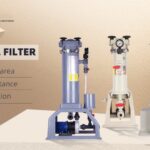
# Electroplating Filter: Enhancing Efficiency and Purity in Metal Deposition Processes
Electroplating is a critical process in various industries, from automotive to electronics, where metal deposition is essential for enhancing the durability, conductivity, and aesthetic appeal of components. However, the efficiency and quality of electroplating heavily depend on the purity of the plating solution. This is where electroplating filters come into play, ensuring that the solution remains free from contaminants that could compromise the final product.
## The Role of Electroplating Filters
Electroplating filters are designed to remove impurities such as dust, dirt, and other particulate matter from the plating solution. These impurities can originate from various sources, including the raw materials used in the plating process, the environment, or even the equipment itself. If not removed, these contaminants can lead to defects in the plated surface, such as pits, roughness, or uneven coating thickness.
By integrating high-quality electroplating filters into the system, manufacturers can significantly improve the consistency and quality of their plated products. These filters work by trapping particles as the solution passes through, ensuring that only clean, contaminant-free liquid reaches the plating bath.
## Types of Electroplating Filters
There are several types of electroplating filters available, each suited to different applications and levels of filtration:
– Cartridge Filters: These are commonly used for their ease of replacement and high filtration efficiency. They are ideal for removing fine particles and are available in various materials to suit different chemical environments.
– Bag Filters: These are cost-effective and suitable for applications where large volumes of solution need to be filtered. They are particularly useful for capturing larger particles.
– Depth Filters: These filters are designed to trap particles throughout the entire depth of the filter media, making them effective for removing a wide range of contaminant sizes.
## Benefits of Using Electroplating Filters
The advantages of incorporating electroplating filters into the metal deposition process are numerous:
– Improved Product Quality: By ensuring a clean plating solution, filters help produce smoother, more uniform coatings, which are essential for high-performance applications.
– Extended Equipment Life: Contaminants can cause wear and tear on plating equipment. Filters reduce this risk, leading to longer equipment lifespan and reduced maintenance costs.
– Cost Efficiency: Cleaner solutions mean fewer rejects and reworks, translating to lower production costs and higher throughput.
– Environmental Compliance: Filters help in managing waste by reducing the amount of contaminants that need to be disposed of, aiding in compliance with environmental regulations.
## Choosing the Right Electroplating Filter
Selecting the appropriate filter for your electroplating process involves considering several factors:
– The type and size of particles to be filtered
– The chemical compatibility of the filter material with the plating solution
– The flow rate and pressure requirements of the system
– The frequency of filter replacement and ease of maintenance
Consulting with a filtration expert can help you choose the most suitable filter for your specific needs, ensuring optimal performance and cost-effectiveness.
## Conclusion
Electroplating filters are indispensable in modern metal deposition processes. They not only enhance the efficiency and purity of the plating solution but also contribute to the overall quality and durability of the final product. By investing in the right filtration system, manufacturers can achieve superior results, reduce operational costs, and maintain compliance with industry standards. As technology advances, the role of electroplating filters will continue to evolve, offering even greater benefits to the electroplating industry.
Keyword: electroplating filter

